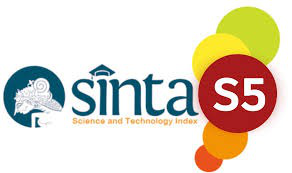The Effect of Online Communication and Use of Information Systems on Audit Quality
Abstract
During the Covid-19 pandemic it became a challenge for the Public Accounting Firm to carry out audit procedures. During the Covid-19 pandemic, physical meetings or communication between auditors or public accountants and a company's clients were limited, so these meetings, which were generally held face-to-face, became online meetings. The main obstacle for auditors or public accountants during the Covid-19 pandemic is that the audit procedures that must be carried out for the 2020 financial statements will be different from the previous year. In general, audit engagements or communication with clients to obtain audit evidence is carried out face-to-face, but to reduce the spread of the Covid-19 virus, such communication is carried out online. Of course, these communication issues must still be guided by Auditing Standard 260 regarding communication with those charged with governance. This study aims to determine the effect of online audit communication and the use of information systems on audit quality. This research is research with the aim of testing the hypothesis. Studies that engage in hypothesis testing usually explain the nature of a particular relationship or determine the independence of two or more factors in a situation. This study uses an explanatory method where the researcher wants to find the cause of one or more problems. This study aims to determine the effect of online audit communication and the use of information systems on audit quality. This research is research with the aim of testing the hypothesis. Studies that engage in hypothesis testing usually explain the nature of a particular relationship or determine the independence of two or more factors in a situation. This study uses an explanatory method where the researcher wants to find the cause of one or more problems. This study aims to determine the effect of online audit communication and the use of information systems on audit quality. This research is research with the aim of testing the hypothesis. Studies that engage in hypothesis testing usually explain the nature of a particular relationship or determine the independence of two or more factors in a situation. This study uses an explanatory method where the researcher wants to find the cause of one or more problems.
Keywords
Full Text:
PDFReferences
Albitar, K., Gerged, A. M., Kikhia, H., & Hussainey, K. (2020). Auditing in times of social distancing: the effect of COVID-19 on auditing quality. International Journal of Accounting & Information Management, 29(1), 169-178.
Alimbudiono, R. S. (2020). Accounting knowledge as a contributing intention on improving public accounting profession. Journal of Asian Finance, Economics and Business, 7(9), 801-809.
Christiawan, Y. J. (2002). Competence and independence of public accountants: reflections on empirical research results. Journal of Accounting and Finance, 4(2), 79-92.
DeAngelo, L. E. (1981). Auditor size and audit quality. Journal of accounting and economics, 3(3), 183-199.
Djalil, M. A., Indriani, M., & Dariyansah, F. (2016). The Influence of Leadership Style, Integrity and Organizational Commitment on the Performance of State Development Audit Agency (BPKP) at BPKP Representative Office of Aceh Province, Indonesia. Indonesia. Reserach Journal of Finance and Accounting, 7(24), 32-37.
Giessner, S. (2016). Organisational mergers: a behavioural perspective on identity management (No. EIA-2016-067-ORG).
Gresho, P. M., & Sani, R. L. (1998). Incompressible flow and the finite element method. Volume 1: Advection-diffusion and isothermal laminar flow.
Habib, F. A., Putra, B. A. W., & Setyono, B. (2020). Gender Stereotypes Portrayed in A Senior High School English textbook Published by Indonesia Ministry of Education and Culture. Jurnal Edukasi, 7(2), 22-27.
Legowo, M. B., Prayitno, D., & Indiarto, B. (2021, December). Digital economy inclusiveness information system model to encourage national economic recovery: Recover together, recover stronger. In Conference Towards ASEAN Chairmanship 2023 (TAC 23 2021) (pp. 61-67). Atlantis Press.
Luo, Y., & Malsch, B. (2020). Exploring improvisation in audit work through auditors’ response to COVID-19. Available at SSRN 3643823.
Nurbaiti, A., & Permatasari, N. P. A. I. (2019). The effect of audit tenure, disclosure, financial distress, and previous year’s audit opinion on acceptance of going concern audit opinion. HOLISTICA–Journal of Business and Public Administration, 10(3), 37-52.
Octavia, E., & Widodo, N. R. (2015). The effect of competence and independence of auditors on the audit quality. Research Journal of Finance and Accounting, 6(3), 189-194.
Redjeki, F., & Affandi, A. (2021). Utilization of Digital Marketing for MSME Players as Value Creation for Customers during the COVID-19 Pandemic. International Journal of Science and Society, 3(1), 40-55.
Zarefar, A., Vera, O., & Arumega, Z. (2019). The effect of financial distress, management turnover, audit opinion and reputation of public accounting firm to auditor switching. Jounal of Finance and Accounting, 10, 22.
Zeyn, E. (2018). The effect of internal audit quality on financial accountability quality at local government. Journal of Accounting, Business and Finance Research, 4(2), 74-82.
DOI: https://doi.org/10.46336/ijqrm.v4i2.442
Refbacks
- There are currently no refbacks.
Copyright (c) 2023 Rendi Kusuma Natita, Neni Maryani

This work is licensed under a Creative Commons Attribution 4.0 International License.
Published By:
IJQRM: Jalan Riung Ampuh No. 3, Riung Bandung, Kota Bandung 40295, Jawa Barat, Indonesia
IJQRM Indexed By:
 Creation is distributed below Lisensi Creative Commons Atribusi 4.0 Internasional.
Creation is distributed below Lisensi Creative Commons Atribusi 4.0 Internasional.








